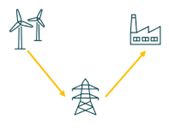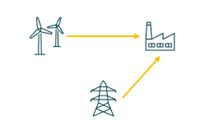As part of the efforts to make the Danish energy regulatory framework accommodating for Power-to-X projects, a draft bill has been presented to the Danish Parliament, proposing to allow the establishment of direct electricity supply lines, thereby reversing the current administrative practice of the Danish Energy Agency ("DEA"). This newsletter takes you through the proposed new rules.
Background
The Danish electricity grid is based on a collective approach where both production facilities and offtakers have been connected to either the collective distribution or transmission grids. The approach has proved successful in expanding and enhancing the Danish electricity grid in areas where the transmission system operator or the distribution system operators ("DSO") may not necessarily have an economic incentive to do so.
The collective approach has entailed that the DEA, with only a few exceptions, has so far not permitted the establishment of direct electricity supply lines from the site of the electricity producing facility, e.g. an onshore wind farm, to the site of consumption, e.g. a factory or data centre requiring large amounts of electricity to operate, thus bypassing the collective grid. Instead, production facilities are currently required to connect to the grid and feed in their entire production, which can then be offtaken at the site of consumption by the end-customer. Only if the DSO has declined to connect the offtaker to the grid can direct electricity supply lines be established.
Green transition and Power-to-X
To promote the green transition, including by accommodating large-scale Power-to-X projects and an anticipated sharp increase in electricity production and consumption, a vast majority of political parties in the Danish Parliament in March 2022 concluded a political agreement on Power-to-X (available in Danish via this link), which included, inter alia, a political agreement to allow the establishment of direct electricity supply lines, and the Minister for Climate, Energy and Utilities therefore presented, on 8 February 2023, a draft bill to the Danish Parliament in order to implement this in the Danish Electricity Supply Act (the draft bill is available in Danish via this link).
|
|
|
| Situation today: Production facility supplies the offtaker by feeding electricity into the grid while the offtaker simultaneously takes out electricity at the site of consumption. | Direct line: The production facility can supply the offtaker directly at the site of consumption. Excess demand from the consumption facility can be supplied from the grid. |
Key highlights from the draft bill include:
- Establishing a direct electricity supply line will be subject to approval from the DEA.
- Allowing direct electricity supply lines both onshore and offshore (e.g. in connection with energy islands)
- One production facility may be allowed to supply up to four different consumption facilities (irrespective of ownership). However, the DEA can decline the establishment if the direct electricity supply line in effect functions as a collective grid.
- The electricity supplied via the direct supply line will be subject to taxes, duties and VAT.
- Granting of approvals will take into consideration whether the production facility and consumption facility are located in close proximity.
- The electricity production facility and offtaker must connect on a 10 kV voltage level or above.
In late September 2022, the DEA further sent a draft executive order on the terms for direct electricity supply lines in public consultation (available in Danish here).
In the draft executive order, the DEA has outlined a number of important items:
Item |
DEA Proposal |
| Ownership |
|
| Approvals |
|
| Collective grid |
|
| Voltage levels |
|
| More offtakers or production facilities |
|
| Only for new production facilities |
|
| Distance requirement |
|
| Offshore production facilities |
|
The DEA has not yet published the final version of the executive order, but it is expected that it will be issued once the draft bill has been implemented into law.
Originally published by 21 February, 2023
The content of this article is intended to provide a general guide to the subject matter. Specialist advice should be sought about your specific circumstances.





